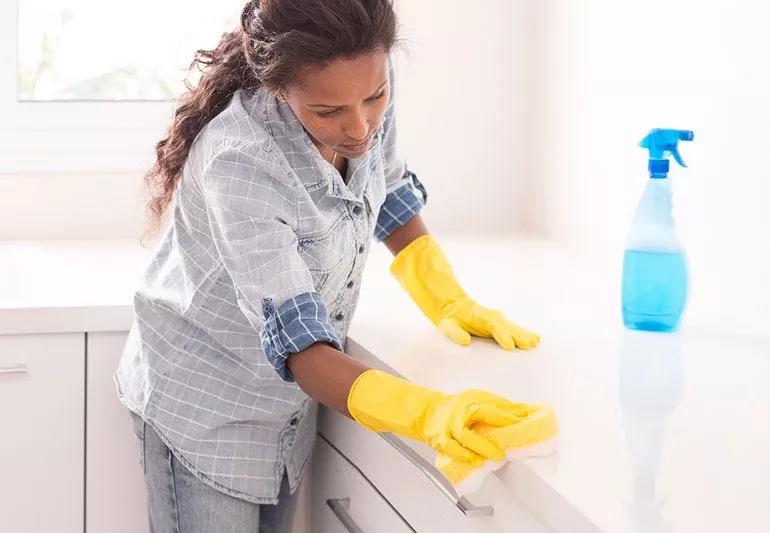The lowdown on how (and where!) to disinfect

Image content: This image is available to view online.
View image online (https://assets.clevelandclinic.org/transform/530f46c4-dda8-48ee-aaaa-68c2928c2ea5/cleanSick-628306310_770x533_jpg)
cleaning after sickness
No matter whether it’s a cold, the flu or a stomach bug that strikes, you know you’ll need to break out the cleaning supplies to protect everyone else in your household. But does your method (or the products you use) matter?
Advertisement
Cleveland Clinic is a non-profit academic medical center. Advertising on our site helps support our mission. We do not endorse non-Cleveland Clinic products or services. Policy
Family medicine physician Dan Allan, MD, says once someone in your house has been infected with a bug, it’s best to break out the cleaning gloves and the bleach.
“I would definitely recommend a bleach-based cleaner,” he says. “There are certain infections, like Norovirus, which are not killed by normal mechanisms — even hand sanitizer will not work on that particular illness.”
It’s important to clean thoroughly after everyone in the house is healthy. Dr. Allan recommends starting with things that are frequently touched, like counters, doorknobs, refrigerator handles, remote controls and especially cell phones.
“Cell phones can have more germs than a toilet seat. It’s amazing what is on a cell phone. You definitely want to clean those routinely,” Dr. Allan says.
Pay close attention to the kitchen, not only because it’s a place where many people gather and touch things, but also because it’s where food and drink are being prepared.
Bacteria and viruses can live on surfaces for a while — sometimes days or even weeks, Dr. Allan says.
He also recommends washing bedding and stuffed animals in hot water and wiping down other objects that can’t be easily washed using a bleach-based cleaner, if possible.
Advertisement
An often-overlooked way to try to stop the spread of illness, Dr. Allan notes, is to change our habits, as difficult as that may be.
“One of the key things that’s hard for people is to not touch their face,” he says. “We touch our faces so many times a day, and half of the time we don’t even realize it. You rub your eye, your nose, scratch your face, lean on your hand — and this is probably one of the biggest habits to stop doing to prevent sickness.”
Dr. Allan also points out that it’s important for those who come down with a contagious illness to stay home from work and school until they’re starting to improve to help prevent it from spreading to other households.
Advertisement

Sign up for our Health Essentials emails for expert guidance on nutrition, fitness, sleep, skin care and more.
Learn more about our editorial process.
Advertisement
While it typically starts in October, vaccine effectiveness can affect its duration and severity
Get vaccinated, consider wearing a mask and stock your medicine cabinet
Influenza puts stress on your body and can lead to serious conditions like pneumonia or stroke
There are three antigenic types of influenza, but A and B are responsible for our flu season
Resting, staying hydrated and taking over-the-counter medicine can help you recover quickly
You can spread the flu to others a day before you feel sick and for several days after
The antiviral medication can help curb symptoms and shorten recovery time
These nutritious foods will help your body to better fight the flu
Type 2 diabetes isn’t inevitable with these dietary changes
Applying a hot or cold compress can help with pain
Pump up your iron intake with foods like tuna, tofu and turkey